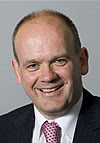This morning the budget committee took evidence from Bob Quick, the former chief constable of Surrey and assistant commissioner at the Met. A while ago Bob had problems when his confidential papers were photographed by journalists in Downing Street, so it was good to see that he had obtained an opaque file holder for today's session, and his evidence was also detailed and useful.
Years of Plenty
Questioned about the period of growth which has led to the Met having the largest workforce in its history, Mr Quick acknowledged that in addition to the demands of neighbourhood policing there had also been growth in homicide investigators and counter terrorism officers. These were needed to respond to the new challenges and threats facing London. There were also more officers supporting partnership working with local authorities, which produced varying results in different areas.
With this growth came an increase in monitoring, management and inspection, which Mr Quick viewed as less welcome. Figures supplied by Professor Marian FitzGerald - who gave robust evidence at our last meeting - demonstrated that a 28% increase in police constables had been accompanied by a 49% increase in police sergeants and a 34% increase in inspectors and higher ranks, so the growth in managers appeared disproportionate. Mr Quick agreed and he predicted that a retreat from the previous target driven culture would lead to less demand for managers. He also agreed that it was worth considering combining specialist teams and reducing the number of borough command units to achieve savings in management and bureaucracy.
A move away from geographically based management to specialist functions had been shown to achieve savings in Norfolk, Surrey and Warwickshire, however the effect on customer satisfaction had not yet been measured. The committee also felt that these county forces were not comparable to London.
Civilianisation
Mr Quick became the latest expert witness to request a move away from simple police officer numbers as a measurement of effectiveness. Measurement of the work undertaken by officers showed that it could be classified as:
60% routine tasks - which is not to say unimportant, including custody processing and taking witness statements. Much of this work could be done by civilians, but public confidence could suffer.
28% bureaucracy - completing paperwork, providing statistics. A single support office assigned to a squad of police could free up a great deal of police time by doing this work for the whole squad.
12% Policing - which must be done by a warranted officer, for example attending court and interviewing suspects. This is where police resources should be focused.
But wide ranging changes to working practices faced formidable obstacles, including legislative barriers and public concerns. These could only be overcome by a consensual approach, securing agreement from the officers and the community they are there to protect.
Thursday, October 14, 2010
Subscribe to:
Post Comments (Atom)

4 comments:
I've never understood why 'civilian' types posts can't be largely filled by either coppers who for various reasons cannot do the physical stuff any more, or those who retire around 50, take the (unfunded) pension and then get another job anyway.
Do you know if Londoners are still paying for policing airports such as London City Airport? The last I heard on the MPA web site was London City saying 'we wont pay if we don't have to'.
At a time when the Government is making drastic cuts in public sector services. Should n't airports pay for their own policing? Should those on modest incomes be subsidising the holidays of the well-off?
----
IN 2007 MPA member Richard Barnes said “Police have to provide a service to protect all those who use our airports, and it is unfair to expect them to pay for policing private, moneymaking businesses. At the end of the day, it is the taxpayer who pays, while shareholders earn dividends. This can be tolerated no longer.”
----
According to my calculations at London City Airport it will only add £2 per (one-way) ticket.
Extract from MPA press release (2006) :
---------------------------------
“While we support the recommendations of the Boys Smith review, we do not believe it is acceptable to ask London taxpayers to continue meeting the substantial burden of policing London City Airport until such time as a new policy on designation is introduced and enacted.”
----------------------------------
*** Operators should pay bigger slice of soaring cost of policing airports *** http://www.mpa.gov.uk/news/press/2007/07-037/?qu=london%20city%20airport&sc=2&ht=1
----------------------------------
London City Airport has the cheek count policing jobs as jobs *it* creates even though it has not paid a penny.
An interesting question about the airport, which I can't answer off the cuff. We have a question time with the police coming up and as it is focused on the budget, there is an ideal opportunity to raise the issue again.
The idea that business should make a contribution to policing costs that they incur is one that I support. It could also apply to sports events, trade conferences, and most of all to nightclubs and rowdy bars.
And I didn't know they counted police in their 'job creation' figures. That seems more like work creation than job creation, and the two things are different.
Football clubs do contribute to the policing costs of their matches, but only for the policing inside the ground.
link
Who funds the Transport Police?
Post a Comment